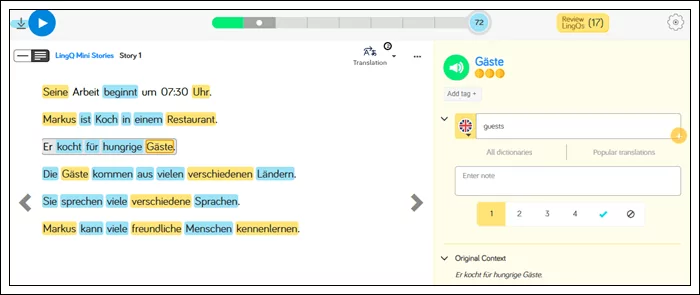A Brief Guide to German Plurals
I once had a friend describe his experience learning German to me. He said, “Everything was going perfect until I ran into the grammar.”
Is that what’s happening to you? Are you wishing you could scrap it all and learn Chinese instead?
I wouldn’t blame you, actually. German plurals in particular are famously tricky, such that most language teachers end up writing down all the plural forms along with the singular forms instead of teaching students the rules.
And yes, there are rules. Join us now for a quick and easy breakdown of how to make an excellent guess at the plural form of any German noun – and how to remember them once you guess right.
The easy plurals
You know how in movies (or on the playground) people sometimes make fun of German by adding -en to all the made-up words?
“Du schleinen kreinen ratzenfratzen affenwaffen!”
Perfect nonsense German! I feel rude just writing it! And the reason it works so well is that -en is actually one of the most common plural markers (and therefore word endings) in German.
The tell-tale feminine noun endings -ei, -heit, -keit, -schaft, and -ung all add -en in the plural. And the vast majority of any gender nouns ending in a simple -e can have an –n thrown in and count as an -en ending anyway.
die Erinnerung (memory) – Die Erinnerungen
das Auge (eye) – die Augen
Finally, roughly 75% of neuter nouns simply add an -e in the plural.
Das Pferd – die Pferde
das Dokument – die Dokumente
And here’s an even easier one: pretend that German is English.
There are a number of commonly-used words that just take a simple -s ending like English would. This ending is for words borrowed from neighboring languages (like English, French, and Dutch), names, and abbreviations.
Die DVD – die DVDs
der Merkel – die Merkels
das Menü (daily special) – die Menüs
The Harder Plurals
So in English, you’ll recall that there are a number of wacky plurals like mouse – mice, goose – geese, and teeth…
German does that too. You’ll find that there are several dozen commonly-used words that have “stem vowel changes” like that.
Again, the word endings tend to give it away. Virtually all masculine and neuter words ending in -er or -en in the singular add an umlaut to the stem vowel or make no changes at all. And that kind of makes sense, right? If the word is singular and it already has the -en ending, something else has to change to mark the plural.
Der Wagen – die Wagen
der Apfel – die Äpfel
der Bruder – die Brüder
If it’s a feminine noun that has an umlaut-change for the plural, then it adds an -e.
die Kraft – die Kräfte
die Maus – die Mäuse
Unfortunately, there’s no simple way to look at a word (especially without its article) and know for certain what its plural is going to be. But hope is not lost…
The good news
Did you happen to wonder why it is that most of these irregular plurals are so common? It turns out that they wouldn’t be irregular anymore if they weren’t common! They’re repeated so much in everyday language that they keep their irregularity over time, since they’re easier to remember than rarer words.
For you, that’s actually good news. It means that you’ll be able to easily remember the irregular plurals as long as you actually expose yourself to the language as it’s spoken. Think about it – if you had to learn all the words from a list in a book, it would seem like a monumental task.
But if you just read and listen to real German, the most common words repeat themselves so often that they become impossible to forget.
Remembering German plurals in context
Finding German content to read and listen to is one thing, finding interesting content that is presented in a way where you can easily look up words, listen to the vocabulary, and review is another.
That’s why there’s LingQ to help you learn German online.
Find hundreds of German lessons that have been transcribed and recorded by native German speakers. LingQ presents lessons in a way that allows you to easily read the dialogue and look up words with a single click. You can also listen along if there’s audio attached to the lesson.

If LingQ’s content isn’t enough, you can also import your own German videos, music, blogs, and much more can all be imported into LingQ and turned into the perfect lesson. For more information about how to import, be sure to check out this guide.
Good luck!
Enjoyed this post? Check out polyglot and LingQ cofounder Steve Kaufmann’s blog post on the best way to learn German!
***
Author Bio: Alex Thomas does his best to read and listen to German every day, even as he’s working in China as a writer and English teacher.


